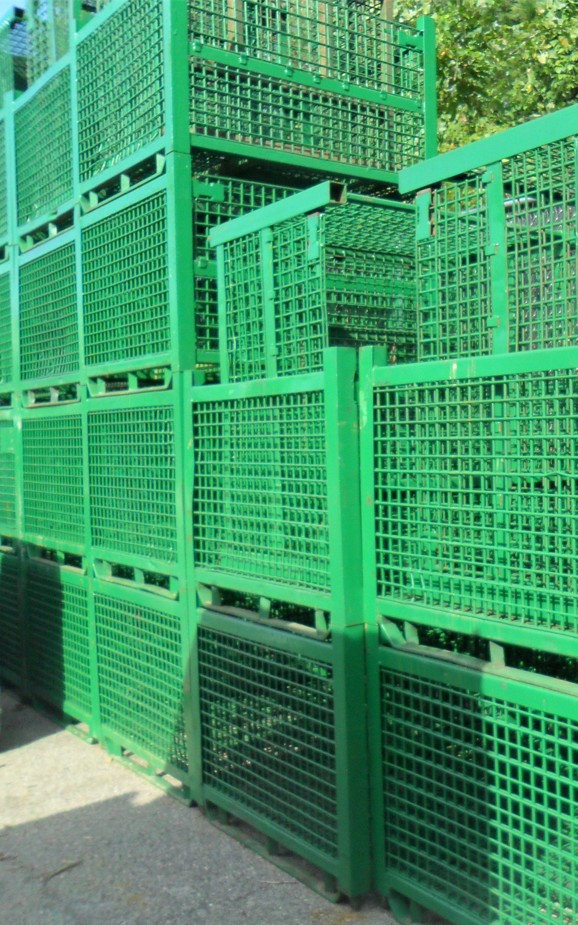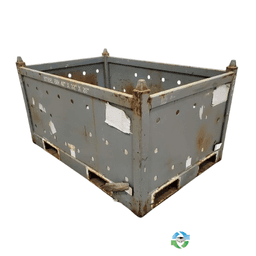The Ultimate Guide to Selecting the Right Bulk Containers for Your Business Needs
Picking the suitable bulk containers is crucial for any kind of organization that depends on efficient logistics. Various sorts of containers exist, each made for details materials and applications. Elements such as dimension, material compatibility, and governing criteria play a considerable role in this decision-making procedure. Understanding these elements can lead to enhanced functional effectiveness. Many organizations ignore vital aspects that can improve their overall performance and sustainability. What are these factors to consider?
Recognizing Various Kinds of Bulk Containers
Bulk containers work as essential devices for companies seeking reliable storage space and transportation remedies. These containers are available in different kinds, each created to fulfill details operational needs. One usual kind is the intermediate bulk container (IBC), which is optimal for granulated and fluid products, offering a balance of capability and ability to move. One more preferred choice is the mass bag, or FIBC, appropriate for completely dry, flowable products. These adaptable containers are lightweight and can be conveniently transferred and stored. For much heavier materials, stiff bulk containers are commonly used, giving sturdiness and security for secure handling. In addition, there are specific containers customized for dangerous products, guaranteeing compliance with safety guidelines. Recognizing the distinctive qualities of these bulk container types enables services to make educated choices that maximize logistics and lower expenses. By picking the ideal container, business can enhance their operational efficiency and streamline their supply chain procedures.
Trick Material Factors To Consider for Bulk Containers
When choosing mass containers, it is crucial to consider the products made use of in their building and construction. Variables such as chemical, toughness, and durability compatibility play a vital function in making certain the containers meet certain functional requirements. Furthermore, weight and mobility concerns can impact both effectiveness and transportation logistics.
Product Toughness and Toughness
Longevity and stamina are crucial elements in picking materials for mass containers, as they directly affect the container's ability to endure various ecological problems and dealing with procedures. Products such as high-density polyethylene (HDPE), polypropylene, and stainless steel are commonly preferred for their robust residential properties, supplying resistance to abrasion, temperature level, and impact fluctuations. The selection of product additionally impacts the overall lifespan of the container; more powerful products typically lead to much less regular substitutes, causing set you back savings in time. Furthermore, the weight of the material can affect shipping costs and convenience of handling. Organizations should consider their details operational environments and the potential for deterioration to assure peak toughness and toughness in their mass container option.
Chemical Compatibility Variables
Recognizing chemical compatibility is necessary for choosing mass containers, as the materials utilized need to withstand the specific materials they will hold. Different factors affect compatibility, consisting of the chemical nature of the materials, temperature, and period of storage. Harsh chemicals may require containers made from stainless steel or specialized plastics that withstand destruction. Furthermore, responsive materials can create warmth or gases, requiring vented or pressure-rated containers. The choice of container material, whether steel, polycarbonate, or polyethylene, ought to line up with the chemical buildings of the kept materials to avoid leakages or breaches. Inevitably, a comprehensive assessment of these compatibility factors ensures risk-free handling and storage, protecting both employees and the atmosphere while maintaining item honesty.
Weight and Transportability Worries
Picking bulk containers entails not only evaluating chemical compatibility yet likewise considering weight and transportability. Services must evaluate the convenience of handling and transport to optimize effectiveness. Lightweight materials like high-density polyethylene (HDPE) or light weight aluminum can facilitate less complicated motion and decrease delivery prices. Alternatively, heavier containers might offer enhanced toughness yet can impede mobility, particularly in environments calling for constant moving. Additionally, the layout of the container must enable for hassle-free training and stacking, ensuring ergonomic safety and security for workers. Firms should likewise think about the framework available for transport; for instance, containers compatible with forklifts or pallet jacks can simplify procedures. Inevitably, the right balance in between weight and mobility directly affects functional effectiveness and expense performance.
Sizing Your Bulk Containers for Optimal Effectiveness
When sizing bulk containers, businesses need to thoroughly analyze the dimensions needed to accommodate their specific products. Furthermore, weight capability is an important factor that influences effectiveness and safety and security throughout transportation and storage space. Reliable sizing not just optimizes room however also maximizes operational workflows.
Determining Container Dimensions
Picking the appropriate measurements for mass containers is crucial for making the most of performance in storage and transportation. Businesses must analyze their certain requirements, taking into account aspects such as offered room, the nature of the goods being saved, and the approaches of transportation made use of. Precise dimensions ensure that containers fit ideally in cars and storage facilities, minimizing lost area and reducing dealing with time. Criterion sizes can supply benefit, yet personalized dimensions could be needed for distinct needs or to fit certain products. Additionally, it is necessary to evaluate stacking capabilities and availability, as these variables influence overall functional efficiency. Inevitably, the right measurements cause enhanced organization and streamlined logistics, benefiting the general performance of business.
Weight Ability Considerations
Understanding weight special info ability is important for services aiming to enhance their mass container effectiveness. The weight capability of a container directly impacts storage capabilities, transport logistics, and general functional prices. Picking containers with the ideal weight limitations guarantees that companies can safely keep and deliver their goods without taking the chance of damages or compliance issues. Overwhelming containers can result in structural failings, while underutilizing capacity cause wasted resources. It is essential for organizations to analyze their item weights and think about any kind of governing requirements when choosing containers. Furthermore, aspects such as the sort of material, meant usage, and ecological conditions must additionally affect weight ability choices. By examining these aspects, organizations can boost performance and ensure a structured supply chain.
Regulatory Compliance and Safety Criteria

Governing conformity and security criteria play an essential role in the choice of mass containers for services. Organizations needs to guarantee that their containers fulfill various policies established by regional, national, and international authorities. These criteria typically concern product safety and security, structural integrity, and proper labeling, which aid stop mishaps and ensure the safe transportation of products.
Additionally, adherence to industry-specific guidelines, such as those from the Fda (FDA) or the Occupational Security and Wellness Management (OSHA), is vital for firms managing dangerous products or food. Non-compliance can cause penalties, lawful concerns, or damages to a business's online reputation.
Companies must also take into consideration the container's compatibility with the materials being saved or transported to avoid contamination or chain reaction (used bulk containers). To summarize, comprehending and applying governing conformity and security criteria is essential for the liable and efficient use mass containers
Sustainability Options for Eco-Friendly Mass Containers

Firms are also exploring alternatives made from recycled materials, which not just conserve resources however also support the recycling industry. Advancements in layout enable for lighter containers that need much less energy to transportation, better boosting sustainability. By incorporating these green mass container alternatives, businesses can demonstrate their commitment to ecological stewardship while meeting consumer need for sustainable practices. This shift not just helps the planet yet can check out this site additionally boost brand name online reputation and client commitment.
Cost-Effectiveness and Budgeting for Mass Containers
While many companies focus on sustainability, cost-effectiveness stays an important factor when selecting bulk containers. Organizations should evaluate the preliminary acquisition price, along with lasting operational prices, to guarantee monetary stability. Variables such as reusability, resilience, and upkeep play a substantial role in determining total expenses.
Investing in premium containers may yield higher upfront expenses yet can lead to financial savings through reduced replacement rates and decreased waste. Additionally, organizations should think about transport costs and storage space effectiveness, as these can influence the general budget.

Often Asked Inquiries
Just how Do I Figure Out the Right Container for Hazardous Materials?
To determine the right container for harmful products, one must examine compatibility with the substance, think about the container's product, check for regulative conformity, and evaluate ability and safety and security features to guarantee correct handling and storage.
Can Bulk Containers Be Personalized for Details Products?
Yes, bulk containers can be customized for certain products. refurbished bulk containers. Numerous functions, such as layout, material, and dimension, can be customized to satisfy unique demands, making certain excellent security and efficiency for moving and keeping various items
What Is the Ordinary Life Expectancy of Different Bulk Container Types?
The ordinary life expectancy of bulk container kinds varies; plastic containers last 5-10 years, metal containers 10-20 years, and wooden containers generally last 3-7 years, depending upon use, maintenance, and environmental conditions.
Just how Should I Tidy and Maintain Bulk Containers?
To clean up and keep bulk containers, one should consistently evaluate for damage, eliminate residue, clean with appropriate cleaning agents, rinse extensively, and assurance proper drying out before storage. Complying with producer standards improves long life and safety during usage.
Are There Rental Alternatives for Bulk Containers Available?
Yes, numerous companies supply rental choices for bulk containers, offering adaptability for businesses. These rentals can suit numerous needs, enabling firms to take care of stock successfully without the commitment of acquiring containers outright.
Sturdiness and strength are crucial aspects in choosing products for mass containers, as they directly affect the container's capacity to stand up to different ecological problems and managing processes. Understanding chemical compatibility is important for choosing visite site bulk containers, as the products made use of need to stand up to the details substances they will hold. Understanding weight ability is essential for organizations aiming to optimize their bulk container efficiency. Regulative compliance and safety and security criteria play a vital function in the choice of bulk containers for services. While lots of businesses concentrate on sustainability, cost-effectiveness stays a vital element when choosing bulk containers.